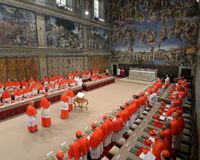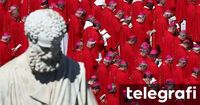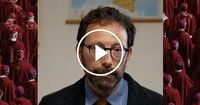The countdown is on. The papal conclave, a centuries-old practice, is set to begin Wednesday, May 7, 2025, to select a successor to Pope Francis. As the clock ticks toward 4:30 PM in Rome, anticipation builds around whether a new pope will emerge swiftly or if this conclave will prove to be one of the more unpredictable ones in recent history.
Historically, the last three conclaves—those that elected Pope Francis in 2013, Benedict XVI in 2005, and John Paul II in 1978—wrapped up within two to three days. Yet, with a new generation of cardinals and varying perspectives, observers are unsure what to expect this time around.
At 4:30 PM, the order "Everyone out" will echo through the halls as the conclave officially opens. Following the Mass at St. Peter’s Basilica, all 133 voting cardinals will make their way to the Sistine Chapel, where they will be locked in for what is anticipated to be intense deliberation. Vatican spokesperson Matteo Bruni indicated that at least two cardinals have suggested the conclave could conclude by Friday, May 9.
On the first day, only one vote will take place. Should no pope be elected during this initial round, four additional rounds of voting—two in the morning and two in the afternoon—are scheduled to follow starting Thursday, May 8. The iconic smoke signals will indicate the outcome: black smoke means no pope, while white smoke signifies a successful election. Bruni noted that the telltale white smoke could rise from the Sistine Chapel chimney as early as 10:30 AM or 5:30 PM on voting days.
As the cardinals gather, they are under strict communication protocols. Upon entering the conclave, they must surrender all electronic devices, including phones and smartwatches, to ensure absolute secrecy. This measure extends beyond the cardinals to everyone inside the Vatican during the conclave, including doctors and dining staff, all of whom are sworn to respect "absolute and perpetual secrecy." John Allen, editor of the news website Crux, explained, "There are electronic jammers to make sure that phone and wi-fi signals are not coming in or out. The Vatican takes the idea of isolation extremely seriously."
The conclave is not just about secrecy; it also aims to prevent any external influence during this crucial decision-making process. "The whole idea is for this to be a religious decision, not a political one," said Ines San Martin, emphasizing the belief that elections are guided by divine intervention rather than political maneuvering.
While the conclave is shrouded in secrecy, the outside world is not entirely disconnected. Global leaders, including U.S. President Donald Trump, French President Emmanuel Macron, and Italian Prime Minister Giorgia Meloni, are reportedly interested in the outcome of this papal election. Each leader appears to be advocating for a pontiff who aligns with their political priorities, which adds another layer of complexity to the conclave.
Francesco Clementi, a professor at Rome's La Sapienza University, noted that the cardinals could be polarized between those favoring a return to a centralized church governance and those advocating for a more decentralized, international approach. This dynamic reflects a broader trend initiated by Pope Francis, who has appointed cardinals from diverse backgrounds, representing various global perspectives.
As the conclave approaches, the cardinals, many of whom have never met each other before, are expected to engage in meaningful discussions. With 108 of the 133 voting cardinals appointed by Pope Francis, the conclave's composition signifies a shift from the traditional Eurocentric leadership model to a more global representation.
While the conclave's agenda will undoubtedly include discussions on war, peace, and social issues, the next pope will also have to navigate the complex relationship between the Catholic Church and Western nations, particularly the U.S. The late Pope Francis's critical stances on various issues, including war and migration, have left a complicated legacy that the new pontiff must address.
In the lead-up to the conclave, media outlets have speculated on potential candidates, including Cardinal Pietro Parolin, who is among the papal candidates and has been involved in shaping Vatican international policy. However, many commentators believe that the conclave's diverse composition could lead to unexpected outcomes.
As the cardinals prepare to enter the Sistine Chapel, the world watches closely. The next pontiff will not only be tasked with leading the Catholic Church but also with re-establishing its role in global politics amidst rising tensions and changing dynamics.
In this moment of uncertainty and anticipation, the conclave stands as a reminder of the delicate balance between faith and politics. As the cardinals deliberate in secret, the future of the Catholic Church—and its influence on the world—hangs in the balance.



